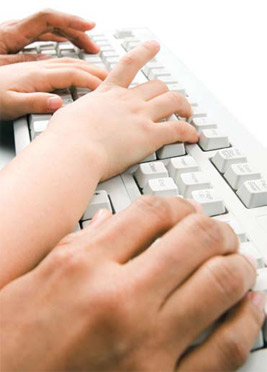You are browsing through videos on cupcake recipes in one of your favourite websites. Just when you are about to write down the recipes, you notice your toddler crawling up your lap to “attack” your computer. It is clear that she is fascinated by what she sees on the screen or what you are doing on the keyboard.
Often, many parents discourage their children from fiddling or playing with the computer in the belief that computers may have a negative influence on their development. Is this justified? Do computers harm a child’s development?
Here are some of the common myths of computer use in children:
Myth # 1: My child is too young to use the computer
This is not true. Research shows that children learn fastest from one to six years of age. At this age, children absorb the most from what they see or learn. Nonetheless, many researches have also recommended that the best age to let children learn to use computer is from the age of three to four years as they would have developed logical thinking and a certain level of intelligence by then.
Myth # 2: Books alone are good enough for learning
It is not wrong to provide your child with all the books in the world. However, you need to know that there are different learning dimensions for your child. Besides reading, ‘play’ is one such activity that helps your child to develop vital intellectual skills. In the same way, computer use can help your child develop one or more of those skills.
Myth # 3: My child will become addicted and be less sociable
This may not happen if we do our part in helping our children strike a balance between time spent on the computer and other activities. For example, we can set rules and conditions such as limiting the time spent a day on the computer or limit its use only for purposes that can benefit learning.
Benefits of Early Computer Use in Children
Enhanced learning skills – Research shows that computer use helps stimulate growing minds, improve recognition of alphabets, verbal skills and communication, and conceptual skills. It also helps your child to adapt and learn faster.
Stimulate creativity – The opportunities to develop creativity through computer use are endless. Programmes which allow your child to compose music, solve complex logic problems, and others help open up a ‘window of opportunity’ for imagination and creativity.
Increased problem solving skills – Those who use the computer are used to working through a problem logically and getting to the root of the problem. This will help your child to have a more logical thought process, as well as to improve his problem-solving skills.
|
How You Can Get Started |
|



Comments